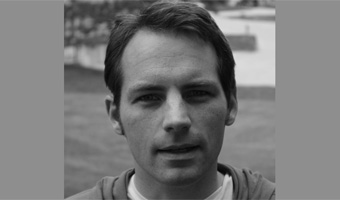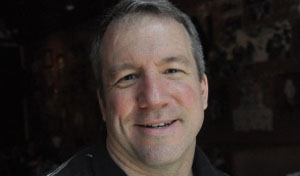The English Department’s 2018 visiting nonfiction visitor, Robert Long Foreman, gives a reading on Wednesday, Feb. 21, at 7:30 p.m.in Walter Hall Rotunda.
Foreman’s work has been appearing in literary magazines since 2006. His essays and short stories have won a Pushcart Prize and contests at The Journal, Willow Springs, American Literary Review, and the Cincinnati Review. Five of his essays have been listed as “Notable” in the Best American Essays anthologies. He lives in Kansas City.
The Stuff of Life: Robert Long Foreman’s Among Other Things
In his collection of essays Among Other Things, Foreman focuses his attention on a variety of objects, ranging from walking sticks to one-handed ceramic busts of German girls to partially-melted skillets. He writes thoughtfully in unexpected, often funny ways about everyday items that gain weighty significance from his contemplation of the objects themselves and what our usage of them reveals about us. Foreman begins his essay “Clubs” with his purchasing of an antique, wooden club that he buys out of curiosity. He then incorporates his own family’s past involving the KKK in addition to offering searing societal condemnation of police brutality. In sharp contrast to this essay, “Dirty Laundry” reflects upon a set of women’s clothing left behind in his apartment in Athens, Ohio, and the peculiarity of being responsible for an unmet stranger’s very personal belongings.
“Guts” reveals Foreman’s thoughts about his own quiet vegetarianism in comparison to Adolf Hitler’s more zealous commitment to meatlessness. Foreman imagines his own reluctance to exacerbate conflicts while sitting down to dinner with Hitler: “I would sing the praises of chickpeas, and worry that by discussing food instead of his atrocities, I might be doing something unforgivable.” Foreman’s meditation on an evening with Hitler foregrounds how extremists are able to become extreme in part because the more thoughtful among us are too polite to share our convictions. This particular vignette illustrates how Foreman coaxes significant truths out of everyday dilemmas, like the social anxiety that may prevent meaningful dialogue, and thus changed perspectives, during a shared meal.
Foreman is endlessly reflective, witty, and very frequently wise, and he uses the solidity of objects to examine our fragmented, shifting nature, to create surprising revelations about how objects come to symbolize us, how objects can augment our abilities, and how objects gain and lose their meaning to us. Foreman’s voice is personable and self-deprecating, and reading his book feels like meeting up for coffee with an introspective friend you have always suspected may be a bit smarter than you. You are grateful he suggested the get-together.




















Comments